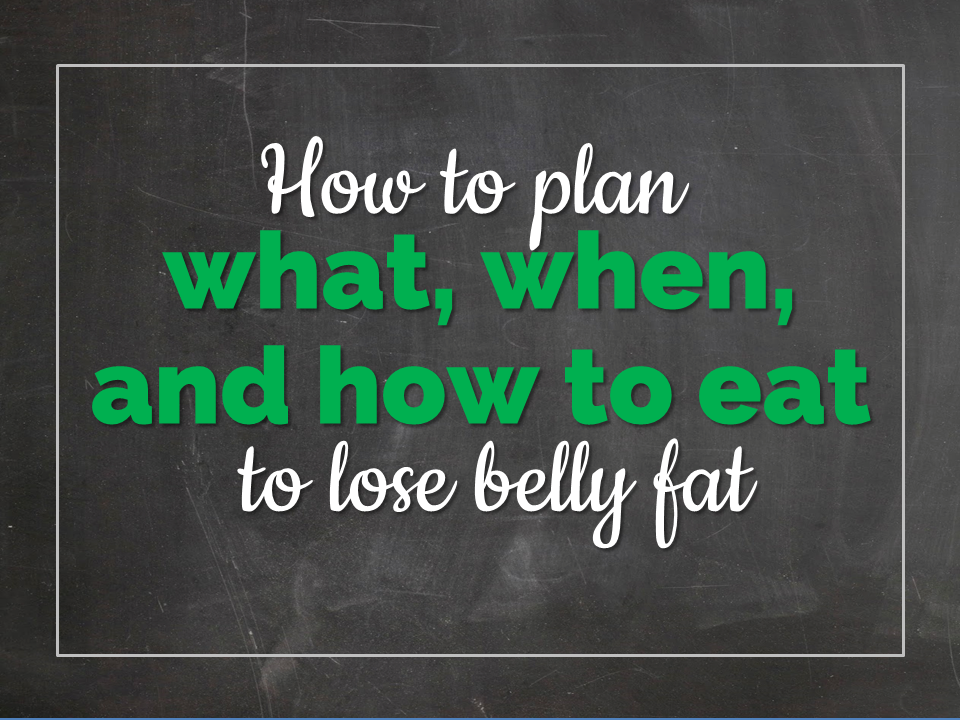Do you know what’s for dinner tonight?
If you don’t yet know, then this post is especially for you.
If you want to lose belly fat, or any fat, or just move your health needle a little closer to GREAT HEALTH, I believe this is the number one thing to do:
Plan exactly when, what, and how to eat.
Now, you may be rolling your eyes at me right now.
Because maybe you don’t want the extra pressure of planning your food on top of everything else, or maybe because food is more fun when it’s spontaneous.
I get it.
Planning seems to take time – at least up front – and I too enjoy the spontaneity of a good delivered pizza from time to time.
But, when it comes to eating, planning makes all the difference in healthy versus crap.
When you have a goal to balance your hormones and lose belly fat, planning will get you there.
And to help you get there, it’s important to keep in mind:
Food is energy.
Of course, it can be tasty, but it’s important to put food in its place as nourishment, not entertainment.
Because when food becomes your excitement, or even your escape, then you’re likely going to struggle with extra body fat.
And the antidote to that is to plan, plan, plan.
Three plans.
- Plan exactly what you’re going to eat at all meals at least 24 hours ahead of time, including any treats.
- Plan specific meals that you can rotate and repeat
- Plan to eat when you’re hungry and stop before you’re full.
And the more specific and practiced you get with these three plans, the more chance you have at making belly fat loss happen for real.
So, is your voice of resistance piping up yet?
She’s probably saying that I’m trying to take all the fun and pleasure out of your life, and that I’m a big old party pooper.
You can hear her out.
Really, let her get it all out.
And then make a choice.
What is it you really want?
If you just want to eat spontaneously whenever and whatever you want, then go with that, and enjoy!
But if you honestly want to feel better, balance your hormones, lose fat, get healthy, have more energy, and feel empowered in your body, then why not give this a shot?
So, where should you start?
Well, I think the place to start is here and the best time is right now.
So, get a paper and pen.
Now think about your day tomorrow.
1. Plan 24 hours ahead
Where will you be?
Is it a weekday or the weekend?
Are you going to be eating somewhere other than at home?
These are important questions that will help you plan your next 24 hours.
But the first question to ask is WHEN.
WHEN will you eat the first meal of the day?
This is important because we usually plan our days around our food.
If you’re eating before leaving home or working in the morning, you need to make time for that.
However, maybe your first meal is later, like mine.
I practice intermittent fasting, which has really helped reduce bloating for me.
So, although I wake up at 4am during the week, I only eat my first meal around 9am.
I know this, I plan for this.
Then, next question, WHEN will you eat your last meal of the day?
Write that time down.
For me, as I try to keeping my eating window to about 9 hours, so my last meal is usually no later than 6pm.
And that’s also the last time I eat before bed.
Which is also important to know.
Then once you have these times, be consistent with your whens.
Your body can learn to eat on any schedule, so create a schedule that works for you and you can stick to most of the time.
The next question is WHAT.
WHAT exactly will will you be eating?
I say exactly, because it’s important to plan all your food, and not leave anything to chance.
Plan to eat realistically, not perfectly.
And I’m not into calories or points here.
I just want you plan and eat real, whole food as much as possible.
So start with your first meal of the day.
What would you be willing to eat for breakfast that would satisfy you?
And then decide approximately how much you’ll eat of that.
For me, Monday to Friday I have identical breakfasts each day: A 375mL smoothie (usually my favorite green smoothie), a handful of dry roasted unsalted almonds, and two squares of dark chocolate.
Yes, chocolate for breakfast… Don’t judge me 😉
On weekends, I usually go for a run before breakfast and then look forward to cooking up a 3-egg omelette, fresh fruit, usually a piece of whole grain toast.
And, of course, a cup of David’s Tea, usually Organic Cream of Earl Grey.
These are my breakfasts.
For lunch, I usually eat left over supper from the night before.
Simple.
Stress free.
The take-away here is to make meals simple and predictable.
Of course sometimes the routine doesn’t happen because you’re going out for dinner to a restaurant or to a friend’s place (less now during Covid, however.)
In those cases, find out what you’re going to be eating before you get there.
Menus are online, so check them from home, or call and ask the person who’s making dinner.
What’s important is that you know pretty much what you’ll be eating and if that works for you.
If what’s being served doesn’t work for you, are there some changes that can be made? Or is there something you can bring?
So, for example, if ordering from a restaurant, can you get roasted veggies instead of fries if that’s what you want? Or can you ask for less than the normal amount?
Or if your friend is ordering pizza and you’d rather not, can you offer to bring something you are willing to eat?
Yes, maybe you’ll feel a little discomfort, but I’m sure if the tables were turned, you’d be very understanding.
The reason for doing this is that takes the pressure off when you get there, because you’ve already made your decision.
2. Plan at least 5 suppers to rotate
Although you may be thinking 5 suppers isn’t enough variety.
But five suppers is just a great place to start.
Because food’s not about excitement, right?
Maybe you’re afraid to get bored.
But that’s kind of the point.
If you don’t want to eat because you ate the same thing last Monday, maybe you’re not really hungry.
And you can always then increase your rotating meals from 5 to 10 or 20.
But no matter what the number, planning ahead like this will ultimately cause you to spend less time thinking about food, Googling food, and shopping for food.
When you know what you’ll be eating Monday to Friday, and even Saturday and Sunday, life gets a whole lot less stressful.
And with less stress about what to make for dinner, and less spontaneous meals, losing fat gets begins to happen on its own.
A good tip is to keep these planned meals fairly simple.
Here’s the equation to keep in mind (ok, I like math):
(1 protein + 1 fat + 1 veggie +1 complex carb) * spices = A satisfying, balanced meal
So if we break this down, a protein could be chicken, red meat, fish, pork, legumes, eggs, or dairy.
A fat could be olive oil, avocado, fatty fish, dairy, nuts, seeds.
A veggie could be any vegetable or combination of vegetables in a salad, or grilled, steamed, roasted, or pureed in to a soup.
And a complex carb can be potatoes, sweet potatoes, brown rice, quinoa, or other cooked non-refined grains.
And spices is anything that will enhance the flavor of your food, from salt and pepper, to tumeric, to safron, to parsley, sage, rosemary and thyme.
Get creative with your spices, they can transform your meal.
You can also plan to prepare part of your meals ahead of time.
Like cooking any meats or rice, or cutting up veggies on Sunday before your week begins.
Doing this will help you stick to what you planned when you’re done with a long day at work.
Finally, here’s probably the most important thing to plan:
3. Plan to eat when you’re hungry, and stop when you’re satisfied
This one is key.
As often as possible, respect your body’s signals to let you know when you’re truly hungry.
This is key to balancing hormones, and in turn losing belly fat.
Because it’s literally hormones that trigger these signals.
Ghrelin is responsible for hunger signals, and leptin is responsible to letting you know you’ve eaten enough.
And these hormones may not be functioning super well if you’ve got extra body fat, and/or higher insulin levels.
So, it’s time to allow yourself to get hungry.
And if you’re afraid of being hungry, realize that even if you have low body fat, you could still go at least 3 weeks without food.
So having to delay a meal is never an emergency.
And in fact, allowing these signals to do their job, really feeling your hunger, and stopping eating before you’re full, are a priority to a healthy body.
So, do you know what’s for dinner tonight?
I come back to the very first question I asked.
Feel free to share any ideas for dinners that work for you right here.
For me, I’ve already planned my sweet potato souvlaki pitas for supper.
It’s very similar to chicken souvlaki, but since I’m vegetarian I use roasted, diced sweet potato instead.
And then I have a little Greek salad on the side – and some on my pita 🙂
It’s one of my favorite suppers!
September is almost here and I’ll be camping for week, visiting our beautiful province.
But when I get back I’ll be starting up my Zoom Yoga class – stay tuned for the details – and taking on three new coaching clients for the fall.
I hope I see you soon!
Keep moving forward,
Debbie
P.S. If you, or someone you know, is struggling with belly fat due to perimenopause, I’ve got 3 spots open for coaching starting in September. Just text me at 514-445-6434 or email me at debbie@momentum-fit.ca.
Coaching will be by phone, or through Zoom, Facetime, or Skype.
You can also try a free 30-minute free session with me to find out what coaching can do for you. Just text me or email me and we’ll book a time.



Debbie, you somehow know exactly what I need to hear. It seems to me that all I read about food prep and planning is about variety. I found that thinking I needed so many different ideas that planning became overwhelming and then fell by the wayside. It makes so much sense to have a few core meals that are on rotate. Simplicity is the key to success! Thank you
Thanks Lareina 😊 I agree, simplicity is the key to success.